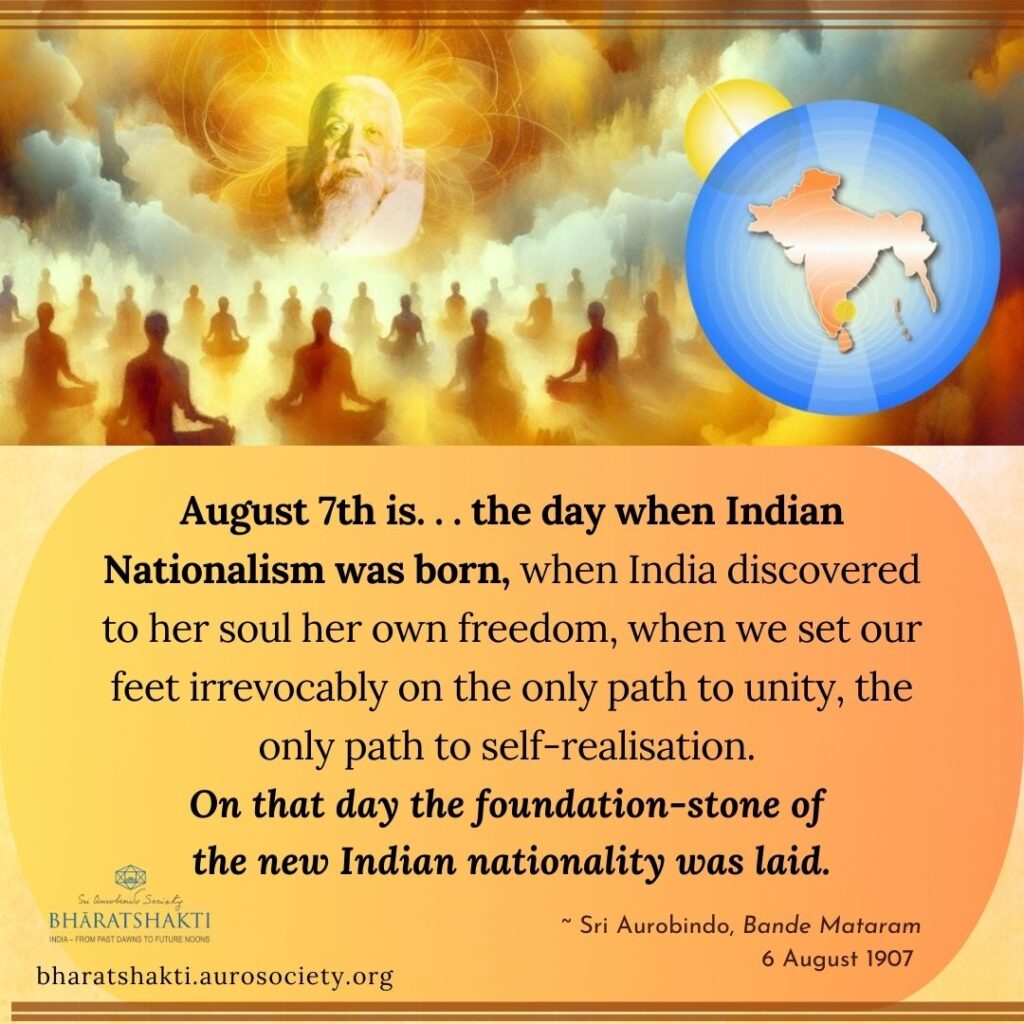Date: August 7, 2024
Sri Aurobindo once wrote that more than the disunity, it was the lack of national feeling among Indians which made the British so easily conquer India. In this context he described the essential difference between national consciousness and patriotism, which he said are two different qualities.
“The patriot lives in a rapture of service to the motherland; he perceives her everywhere, looks upon her as a godhead, and to her offers all work done as a sacrifice for the good of the country; his own interest merges in the interest of the country,” said Sri Aurobindo.
An individual or a people may not be patriotic but still have a strong national feeling and pride that our country is the best, with the best traditions and customs, religion, character, morality, strength, courage, intelligence etc. In this sense the national consciousness is essentially rajasic. An individual with a strong national consciousness will know that the good of my country is his or her own good, the glory of the country is his/her glory, the prosperity of fellow countrymen is his/her own prosperity. This is why such a feeling is accompanied with a strong sense of duty toward the nation, to fight for the honour, glory and prosperity of the nation.
Patriotism, on the other hand, is in its nature sattwic. To use Sri Aurobindo’s expression, “one who can lose his ego in the ego of the country is the ideal patriot; one who aggrandises the ego of the country, all the while maintaining intact his own ego is a nationally conscious individual.”
For example, courage, Sri Aurobindo says is the first quality, absolutely essential if we truly wish to work for the glory of our motherland. No half-baked, wishy-washy patriotism; the Mother asks for sacrifice. Only a complete faith in the Divine who is leading the nation to her glorious future and a total freedom from fear will make us ready if we truly want to embody the true spirit of nationalism.
In another writing he emphasised on the psychological rather than the physical principle as the foundation of nationality. Nationhood, according to him, refers primarily to the notion of psychological unity which, in turn, might be heightened by common collective memories of ancient traditions, past heroes and sufferings, by common geographical habitation and by common interests and values.
It was this view of nation which made him speak of nationalism as “the passionate aspiration for the realisation of that Divine Unity in the nation, a unity in which all the component individuals, however various and apparently unequal their functions as political, social or economic factors, are yet really and fundamentally one and equal.” (CWSA, Vol. 7, p. 679).
Sri Aurobindo spoke of nation as a living entity, full of consciousness. It is not merely an intellectual idea, such as the one made notorious by the over-used or over-abused term “Idea of India.” It is not only an emotional sentiment. But it is a throbbing living force, it is life itself. And Life must grow, must evolve, must live fully to realize its potential. That is what a nation is – a living, growing, evolving entity, one seeking to realize its inner being, its nation-soul.
We live in times when the word ‘nationalism’ has somehow become questionable primarily because of West-centric limited and narrow meanings that have gotten attached to it. At a time when some of the so-called ‘global’ citizens even use the word “zealot” in all its negative connotation to speak of those who consider themselves ‘nationalists’ it is important to inculcate a contemplative understanding of Sri Aurobindo’s insights on nation, nation-soul, national consciousness and patriotism.
I write this on the very special date of August 7. This was the date Sri Aurobindo said was when Indian nationalism was born, when India discovered to her soul her own freedom. It was on August 7, 1905 when the formal proclamation of the Swadeshi movement was made with the passing of the ‘Boycott’ resolution at a meeting in Calcutta. In a way, this date signifies the commemoration of India’s declaration of independence and reaffirming her separate national existence. It is to remember and commemorate the start of Swadeshi movement – a movement that has not only economic but social, cultural and psychological significance – that August 7 is celebrated in India as National Handloom Day.
But there are two more reasons why this date of August 7 is significant for Indian Freedom Movement.
1. It was on 7 August 1893, that the first of nine articles in the series titled ‘New Lamps for Old‘ by Sri Aurobindo were published in the journal Indu Prakash. The last one was published on 6 March 1894.
2. On August 6, 1906, the first issue of the nationalist journal ‘Bande Mataram’ was published. On 7 August 1907, Sri Aurobindo wrote in Bande Mataram that “it is only in the fitness of things that the organ of Indian Nationalism should choose the birthday of Nationalism in the country for the purpose of observing its anniversary.”

Sri Aurobindo also wrote that August 7 should be a day of rejoicing and a day of consecration. He wanted people to illumine their homes and their hearts and celebrate this day as a sacred observance and rededicate themselves to the service of their Motherland.
The Mother reminds us how best we can serve our Mother India. She says, “Overgrow your small egoistic personality and become a worthy child of our Mother India, fulfil your duties with honesty and rectitude, and always keep cheerful and confident, with a steady trust in the Divine’s Grace.” This is true patriotism, a sattwic quality which she says is not at all incompatible with yoga.
~ Beloo Mehra
